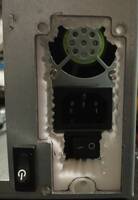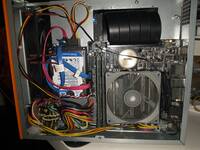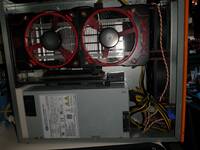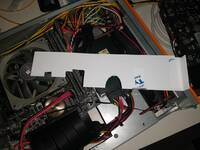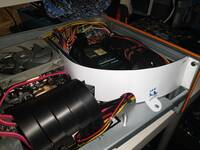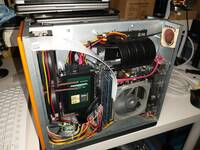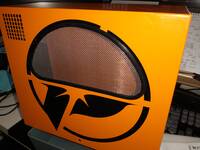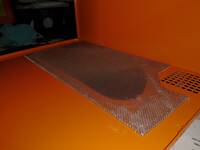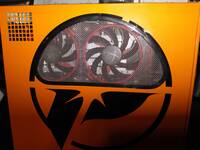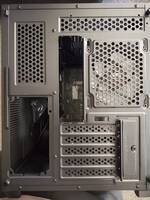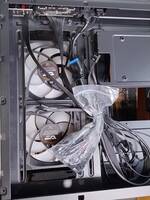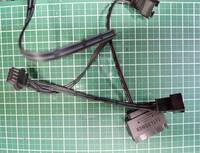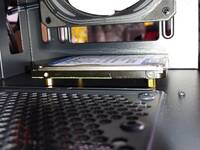strike (gaming)
Summary
Games.
Notes
Hardware
| Make | Custom |
| Year | 2020 |
| Model | ASRock B550M Phantom Gaming 4 |
| Chassis | darkFlash DPW90M |
| Power Supply | 450W SeaSonic S12G-450 |
| Processor | AMD Ryzen 5 5500 |
| Memory | 16GB DDR4 3200 G.SKILL RipJaws V F4-3200C16-8GVKB |
| Ports | 4x USB A 3.1 gen 1 |
| 2x USB A 2.0 | |
| PS/2 combo | |
| DisplayPort 1.2 | |
| HDMI | |
| RJ-45 LAN | |
| 3x 3.5mm Audio jacks | |
| Front USB A 3.0 | |
| 2x Front USB A 2.0 | |
| 2x Front Audio jacks | |
| Graphics | Powercolor Radeon RX 6600 AXRX66008GBD6-3 |
| Storage | 256GB Inland M.2 NVMe SSD |
| 256GB Inland SATA SSD | |
| 500GB Samsung 840 SATA SSD | |
| 500GB WD Scorpio Blue WD5000BEVT | |
| 512GB Inland M.2 NVMe TN320 SSD | |
| Display | Asus VE247 24" 1920x1080 |
| Int. Peripherals | Realtek RTL8111H Gigabit Ethernet |
| Realtek ALC887 Audio | |
| Ext. Peripherals | USB Bluetooth Adapter |
| Dimensions | |
| Length/Depth | 41.3 cm |
| Width | 20.2 cm |
| Height/Thickness | 34.4 cm |
| Weight | 9.09 kg (20 lbs 1 oz) |
Software
| Operating System | Windows 10 |
| Unique applications | - |
Log
Graphics card failure
MSI R9 280X graphics card died. Replaced with XFX RX 460 4GB.
OS reinstall and SSD swaps
Windows reinstalled due to being stuck in an update loop. Swapped SSDs. Sandisk 120GB to Inland 256GB, and Samsung 120GB to Inland NVME 256GB.
Ram Upgrade
Got a pair of DDR3 Kingston K66GKY-HYA S2Q87V PC3-12800U sticks. Went from 8GB to 16GB which matches the rest of the gaming machines.
Parsec Labs case
I got a little Parsec Labs server, and resold the board, CPU, and RAM. Space was limited so I moved strike out of the Fractal Design Define Nano S, and into this tiny case.
I used a delrin block to adapt a Sparkle SPI350U4BM8 supply to the Flex ATX mount. Then the rear mounted 5.25" drive bay became the graphics card mount with a PCIe extension and bracket.
Later I had issues with cooling. Some ducting was adding to force intake air down to the CPU heatsink. A small exhaust fan added up high in the rear.
Finally I cut a hole on the graphics side to give it a better air source. I followed the circle pattern to try to give it a nice appearance. A simple silicone channel was glued around the inner edge, then mesh was glued to the inside of the case. Used silicone caulk.
New case: darkFlash DPW90M
At some point I put a 500GB Samsung 840 SSD in here, I forget when.
Strike moved into a slightly bigger space, and I got a chance to get a bigger case. It's a darkFlash DPW90M. This is a Micro-ATX case with power supply behind motherboard, and tempered glass front/side panel.
It's large for micro-ATX, but short. Valued at $90 it feels like most of the cost went into the glass panels. Still, no sharp edges to deal with. Some cut corners like: only break-away expansion covers, weird screw size choices, thin metal.
The fans were unusual to me. One has a SATA power connector, connection to LED button, and ARGB header. They daisy chain using a special 4-pin connector. The LED button lets you control the lighting with short presses switching modes. Long press seems to switch to RGB after it flashes white once, if you keep holding it will flash twice and turn off. I don't have a way to use the ARGB header at the moment.
Hardware upgrades
New video card, motherboard, and CPU. Also added an extra M.2 NVMe SSD.
This was a budget upgrade which should meet a good set of minimum requirements for modern games. It is only running a 1080p60 monitor so it should be pretty adequate.
- AMD Ryzen 5 5500
- ASRock B550M Phantom Gaming 4 (Micro ATX)
- PowerColor Radeon RX 6600 8GB
- Inland 512GB TN320 M.2 NVMe SSD
I didn't get the motherboard until later on, so I just put the video card in first. Manually updated drivers. M has been made wary about zero RPM mode from bad experience with the last card, so he disabled it, but it shouldn't be a problem with this newer card.
The 5500 is limited to PCIe Gen 3, while the video card, and motherboard support Gen 4. The video card compromises a bit, by going 8 lanes gen 4, rather than a proper 16 lane card. It is technically bandwidth limited, but in benchmarks this seems to be minor (probably disk bandwidth matters more). All the other devices (NVMe SSDs) are gen 3 anyway so they will be fine.
Motherboard install went pretty well. A few minor issues with getting the stand-offs correct meant we installed the board 2.5 times. First boot took a while to post, but otherwise we had no issues.
This board supports both 12V and 5V RGB light systems so it can control the case fan light that we couldn't before. The case fans only have a proprietary 4-pin power connector so I left them daisy-chained off a SATA power connector. No fan speed control.
I did the steps so I could reactivate Windows 10 after a hardware change, but I still ran into trouble. This might have been due to my removal of browsers, and the MS Store. I wrote about it in: Reactivating Windows after a hardware change.
SteamVR breaks in secret ways
We tried to get SteamVR working with the HP Windows Mixed Reality headset on this machine. Something went wrong somewhere, and I spent way too long troubleshooting. SteamVR kept sayng "Please plug in your VR headset", but the headset was working fine in the Windows MR portal.
Some things I tried:
- Reinstalling SteamVR, Windows MR for SteamVR, Mixed Reality Portal, deleting steam cache, etc.
- Installing the Windows Store for app updates
- Using a separate admin user account
- Running steam as admin
- Toggling dumb settings in SteamVR
- A different USB controller/card
The solution was in the last place I looked. Somehow a null gets assigned to some openvr driver path. I finally stumbled upon the solution given by steam user 'hanklord.com' in https://steamcommunity.com/app/719950/discussions/0/3183345176718736883/#c1736632644640478821.
You check the file C:\Users\username\AppData\Local\openvr\openvrpaths.vrpath.
Look at the external_drivers key, and if it is null, replace it with the path for the MR driver like:
"external_drivers" : [ "C:\\Program Files (x86)\\Steam\\steamapps\\common\\MixedRealityVRDriver" ],
I tried looking for a root cause, but couldn't find much, and I'm a bit fed up after spending so much time on this problem.


